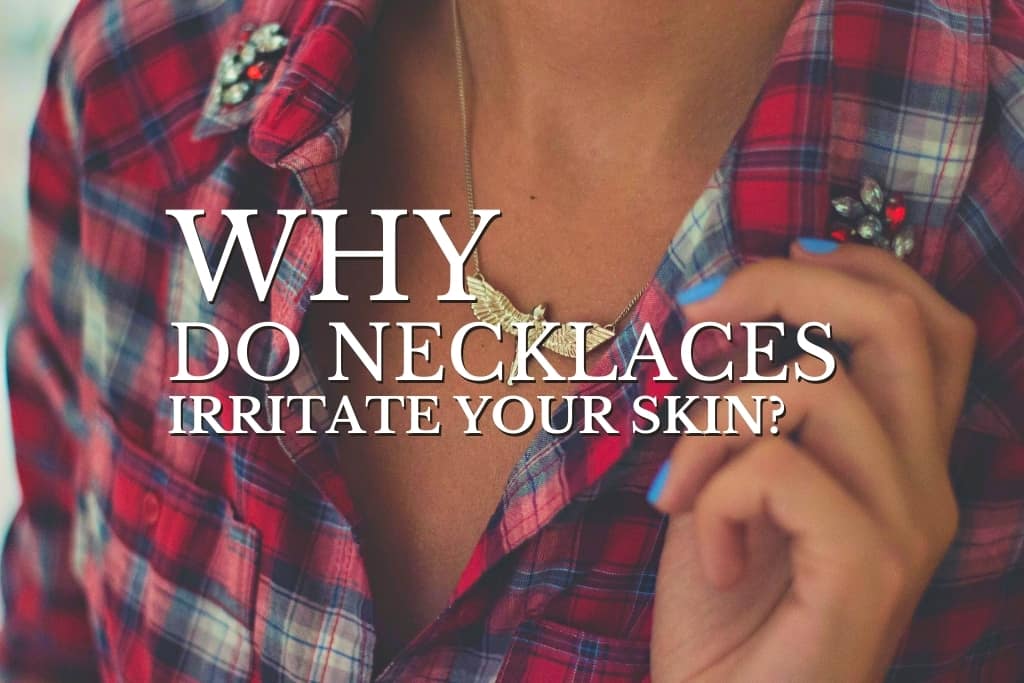A necklace is a great accessory for anyone, whether it’s a fashion statement or a sentimental gift. However, some necklaces can be genuinely harmful to your skin, no matter how beautiful they might be. What causes necklaces to irritate your skin, and what can you do to keep wearing necklaces without your skin suffering?
Necklaces irritate your skin because they’re made of metals that you may be allergic to, like nickel, copper, or brass. Alternatively, your necklace may have developed a tarnish or may have collected impurities. To avoid irritation, buy necklaces made of quality gold, silver, or platinum.
If you want to know more, stick around! I will explain everything you need to know about the materials necklaces are made of and what can irritate you. Moreover, I will show you the materials that are safe for your skin and how you can tell them from others.
Common Skin Irritants Found in Necklaces
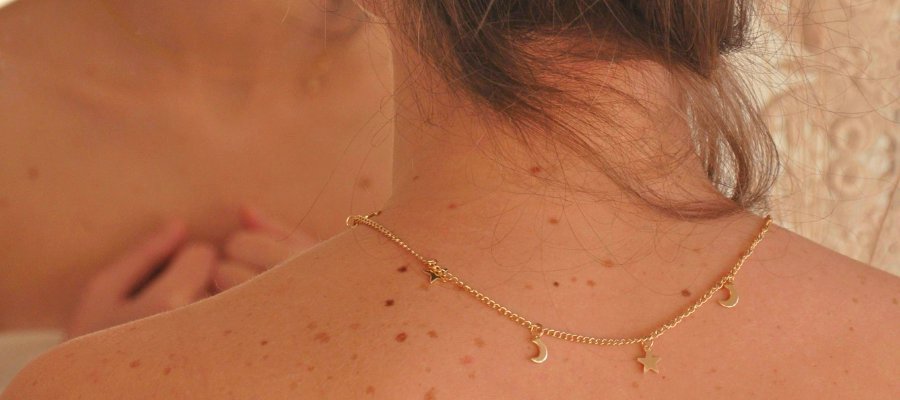
Necklaces can irritate your skin quickly because the skin of your neck is very sensitive, but also because they are made of metals that you may be allergic to. Unfortunately, the cheapest necklaces can also be the most harmful because they are made of cheap metals. Here are some irritants that can be found in cheap or fake jewelry:
Nickel
The most common irritant found in necklaces and any other type of jewelry is nickel. It’s estimated that almost 20% of the general population, especially women, are allergic to nickel, yet, some jewelers use this metal because it is cheaper than the alternatives. Nickel is one of the most common alloys used widely in different industries.
If your necklace is causing rashes and discomfort, chances are it’s made of nickel, and you’re allergic to this metal. This means that your immune system sees nickel as an intruder, just like harmful viruses and bacteria. As a result, your body will react, showing allergy symptoms.
Nickel allergies can develop at any time throughout your life, so don’t be surprised if your skin gets irritated by a necklace you used to wear regularly with no problem. Most fake jewelry is made of nickel, so avoid buying any once you find out it causes irritation on your skin.
Other Materials You Should Avoid
You now know that you should avoid nickel, but what other metals can cause allergies? While nickel is the number one irritant for many people, there are several other metals that you can be allergic to, and that you should avoid.
Stainless steel is typically considered safe, but sometimes it can contain significant percentages of nickel, irritating your skin. Some people are also allergic to copper, so they should avoid any copper or rose gold jewelry. Rose gold is made of a gold and copper combination that may irritate your skin if you are allergic.
You should also avoid jewelry made of brass if you’re allergic to copper since brass is a zinc and copper alloy. Some kinds of plated jewelry have a brass base, which causes them to turn green after a while, so make sure to avoid them.
Even gold can cause allergies if it’s not pure. Some jewelers use alloys to make a gold piece have the desired color. For instance, some types of yellow gold contain copper, while some types of white gold contain nickel.
Impurities
Sometimes, the cause of your skin rash isn’t the necklace itself but the dust, bacteria, or other irritants on its surface. The sensitive skin of your neck can break into a rash when it comes into contact with materials that are not properly cleaned. Small particles found on jewelry can easily cause allergic reactions or simple irritations.
You should consider this potential cause if you’re not aware of any allergy to metals or if you’re wearing hypoallergenic jewelry made of pure metals.
Symptoms of Nickel Allergies
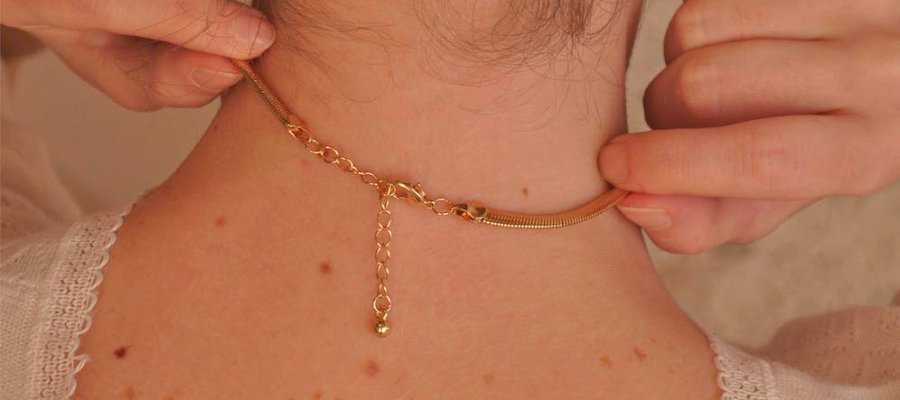
Different factors may irritate your skin, but there are certain signs that can help you identify your nickel allergy:
- Your skin itches in the general area around your necklace.
- You may get skin rashes that burn.
- Your skin may get extremely dry in some areas, causing the skin to peel.
- You have swollen and tender skin around your necklace.
In more severe allergies, the rash might spread all over your body, making you feel itchy and sweaty. Sometimes, the skin breaks and lets bacteria in, leading to dangerous infections that need medical attention.
How To Treat Irritated Skin
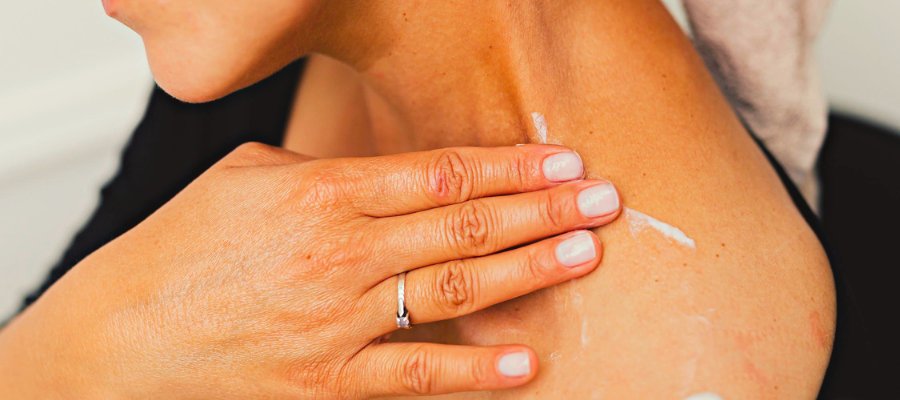
In order to avoid the most severe cases, you need to learn how to recognize signs of a nickel allergy and act fast to get rid of the symptoms as soon as possible. You should know that once you develop a nickel allergy, you won’t be able to get rid of it permanently; you can only treat the symptoms. However, you can find ways of avoiding it.
Here’s what to do once you realize your skin is irritated because of a nickel allergy:
- Remove the jewelry immediately. The longer it stays, the more irritation it can cause, so make sure to remove the jewelry and avoid touching it.
- Use a wet cloth to clean and soothe the affected area. The cloth may get rid of any remnants of the different irritants but can also help relieve your itching.
- Consider taking corticosteroid creams or antihistamines to fight the symptoms that you’re showing. Consult a doctor for the best solution.
- Moisturize continuously. Moisturizers help relieve the symptoms of your allergy and maintain your skin’s natural barriers.
How To Tell if a Necklace Is Made of Nickel

Once you realize you’re allergic to nickel, you should ensure you never use any jewelry made of this material because it will always cause irritation or even infections in the worst case. Of course, you can never be sure what your jewelry is made of by just looking at them, so you should take steps to determine what exactly they are made of before you wear them.
The first step is to check the materials on the label or the jeweler’s website before you purchase the necklace. If you see nickel on it, even if it’s a low percentage and the necklace seems to be gold or silver-plated, you should not buy it.
If you’re severely allergic, you must make your own tests, no matter what the label says. You can find nickel-testing kits online or in your local drug store, which can help you understand whether you can wear your necklace or not. Just apply the solution of the test kit on the necklace and then rub it with a cotton swab; if it turns pink, there is nickel in it.
Which Materials Are Safe?
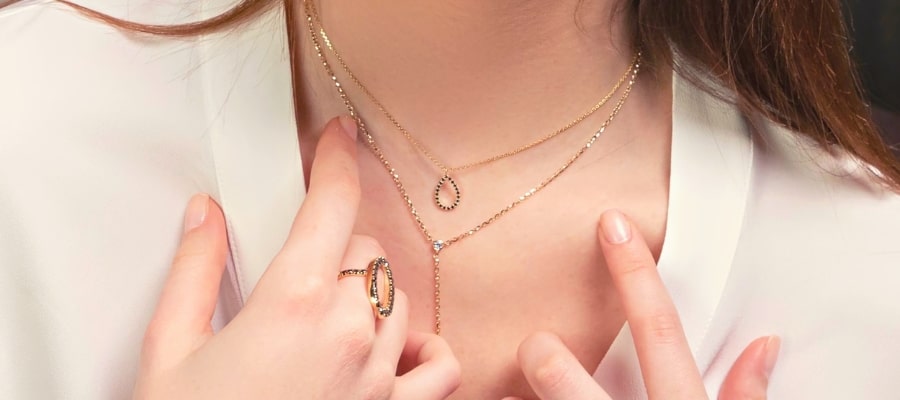
Plated jewelry can be safe for most people, even those with mild allergies, especially when the metal plate is above 18 karats. Anything above 18 karats means that the alloy constitutes a low percentage of the whole piece, which means it has a low chance of bleeding into your skin and irritating it.
You can buy jewelry made of a very high percentage of pure gold or silver, which are typically very hard to find. Jewelry made of 100% pure gold or silver is impossible to make because both of these metals are too soft for this purpose. However, if you have severe allergies, you should avoid gold or silver-plated products just to be safe.
Alternatively, you should look for platinum jewelry, which doesn’t contain alloys and doesn’t tarnish. Platinum looks great and doesn’t cause allergies, but it’s also quite rare and can be more expensive. However, if you have money to spend and are severely allergic, it’s better to choose platinum than gold or silver.
If you want a cheaper option, you can look for tantalum jewelry. Tantalum is hypoallergenic and very durable, so it’s not likely to tarnish. This metal has a gray hue and a matte finish and is used mainly for male jewelry, mostly for rings.
Can Gold or Silver Jewelry Cause Irritation?
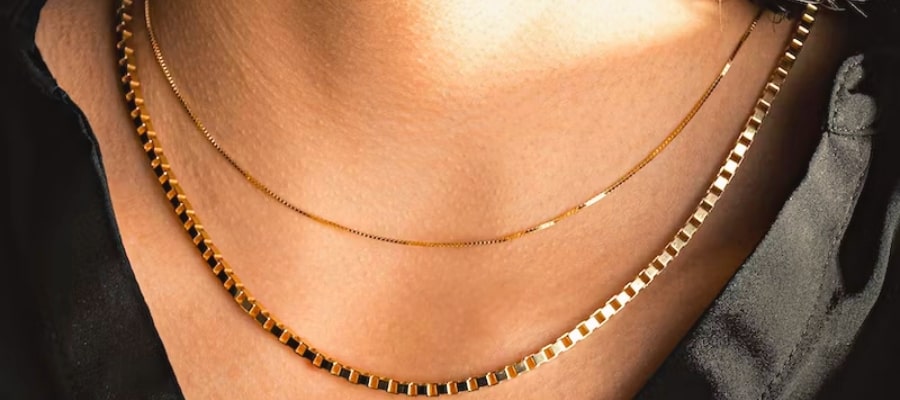
Now that you know what metals to avoid and what to choose for your necklaces, you probably won’t deal with skin irritation because of jewelry anymore. However, sometimes even materials you consider safe can irritate your skin.
For instance, gold or silver-plated jewelry can still be an irritant if it has a brass or nickel base, as I explained above. Moreover, silver necklaces, in particular, can tarnish, even if they are mostly made of pure silver.
Tarnish occurs when silver comes into contact with sulfur, creating silver sulfide. Because the atmosphere contains sulfur compounds, your silver necklace can tarnish after a while, resulting in discoloration. Tarnish is also an irritant that can cause rashes, so make sure never to wear a necklace if you notice signs of discoloration.
Tips on Avoiding Irritation Caused by Necklaces

As you can see, it’s very hard to find a good necklace that doesn’t irritate your skin, especially if you’re allergic to some types of metal or have sensitive skin. To make sure you avoid this unpleasantness, keep in mind these tips below:
Throw Away Cheap Jewelry Made of Nickel
Once you experience irritation, there’s no point in keeping something that makes your skin red and itchy. Even if you don’t experience a rash right away, you might as soon as the plating wears off, which it inevitably will, because of the low quality of the product.
The low price makes nickel necklaces attractive, but the potential for rashes and the overall poor quality should convince you that spending a bit more will make a difference.
Buy From the Right Jeweler
Generally, you should buy from specialized jewelers rather than mass producers who aim to maximize profits by sacrificing quality. It’s true that necklaces made by reputable jewelers will be more expensive, but they will last longer and not cause any problems. You can choose a classic model that goes with pretty much any outfit to keep one good necklace instead of many cheap and fake ones.
Unfortunately, it’s becoming harder and harder to find affordable, good-quality jewelry. Even high-end companies and designer brands often just use gold or silver plating with nickel or copper bases, which can cause irritation. Independent stores that offer handmade jewelry are a better choice and have reasonable prices as well.
Test Your Necklaces
As I already explained above, there are ways of finding out if your necklace is made of nickel or has a nickel or brass base underneath the gold plating. A test kit doesn’t cost much and can help you avoid a very unpleasant situation. If you already know you’re allergic, you should buy a test kit for your peace of mind.
However, even if you’re not sure if you’re allergic, you should avoid nickel necklaces in general because of their poor quality and potential to cause allergies suddenly, so buying a test kit is always a good idea.
Keep Your Necklace Away From Water
Every piece of jewelry should be kept away from water, even the highest-quality ones. Metals tend to react with water, and their reaction may irritate your skin. Moreover, water invites bacteria to develop, which can complicate your situation and cause infections.
Remove your jewelry when you’re showering, working out, or doing any activity that can cause your necklace to come into contact with water.
Clean Your Necklaces Regularly
If your necklace is made of pure, hypoallergenic materials and is still irritating your skin, you should consider that it might just need cleaning. To avoid this issue in the first place, you should make sure to clean your necklaces and other pieces of jewelry on a regular basis.
To properly clean jewelry, mix warm water, dish soap, and mild ammonia-based detergent in a small bowl. Place your jewelry inside the bowl and let them soak for a few minutes, and then take them out and wipe them dry with a soft cloth.
Conclusion
There may be many reasons why necklaces irritate your skin, but the most common one is nickel. A large percentage of the global population is allergic to this metal and can have symptoms of this allergy when coming into contact with a necklace made of nickel.
Unfortunately, nickel is widely used in jewelry making, especially for cheaper jewelry. If you can, you should find gold or silver plated necklaces, or even better, buy platinum jewelry to ensure there’s no risk of irritation.


